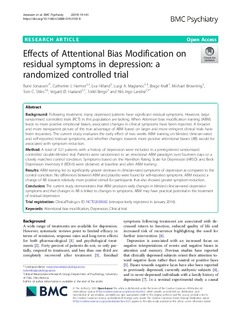| dc.contributor.author | Jonassen, Rune | |
| dc.contributor.author | Harmer, Catherine | |
| dc.contributor.author | Hilland, Eva | |
| dc.contributor.author | Maglanoc, Luigi Angelo | |
| dc.contributor.author | Kraft, Brage | |
| dc.contributor.author | Browning, Michael | |
| dc.contributor.author | Stiles, Tore C | |
| dc.contributor.author | Haaland, Vegard Øksendal | |
| dc.contributor.author | Berge, Torkil | |
| dc.contributor.author | Landrø, Nils Inge | |
| dc.date.accessioned | 2019-10-07T10:43:02Z | |
| dc.date.available | 2019-10-07T10:43:02Z | |
| dc.date.created | 2019-05-15T16:03:06Z | |
| dc.date.issued | 2019 | |
| dc.identifier.citation | BMC Psychiatry. 2019, 19 (141), . | nb_NO |
| dc.identifier.issn | 1471-244X | |
| dc.identifier.uri | http://hdl.handle.net/11250/2620618 | |
| dc.description.abstract | Background
Following treatment, many depressed patients have significant residual symptoms. However, large randomised controlled trials (RCT) in this population are lacking. When Attention bias modification training (ABM) leads to more positive emotional biases, associated changes in clinical symptoms have been reported. A broader and more transparent picture of the true advantage of ABM based on larger and more stringent clinical trials have been requested. The current study evaluates the early effect of two weeks ABM training on blinded clinician-rated and self-reported residual symptoms, and whether changes towards more positive attentional biases (AB) would be associated with symptom reduction.
Method
A total of 321 patients with a history of depression were included in a preregistered randomized controlled double-blinded trial. Patients were randomised to an emotional ABM paradigm over fourteen days or a closely matched control condition. Symptoms based on the Hamilton Rating Scale for Depression (HRSD) and Beck Depression Inventory II (BDI-II) were obtained at baseline and after ABM training.
Results
ABM training led to significantly greater decrease in clinician-rated symptoms of depression as compared to the control condition. No differences between ABM and placebo were found for self-reported symptoms. ABM induced a change of AB towards relatively more positive stimuli for participants that also showed greater symptom reduction.
Conclusion
The current study demonstrates that ABM produces early changes in blinded clinician-rated depressive symptoms and that changes in AB is linked to changes in symptoms. ABM may have practical potential in the treatment of residual depression. | nb_NO |
| dc.language.iso | eng | nb_NO |
| dc.publisher | BMC (part of Springer Nature) | nb_NO |
| dc.rights | Navngivelse 4.0 Internasjonal | * |
| dc.rights.uri | http://creativecommons.org/licenses/by/4.0/deed.no | * |
| dc.title | Effects of Attentional Bias Modification on residual symptoms in depression: A randomized controlled trial | nb_NO |
| dc.type | Journal article | nb_NO |
| dc.type | Peer reviewed | nb_NO |
| dc.description.version | publishedVersion | nb_NO |
| dc.source.pagenumber | 8 | nb_NO |
| dc.source.volume | 19 | nb_NO |
| dc.source.journal | BMC Psychiatry | nb_NO |
| dc.source.issue | 141 | nb_NO |
| dc.identifier.doi | 10.1186/s12888-019-2105-8 | |
| dc.identifier.cristin | 1698142 | |
| dc.relation.project | Norges forskningsråd: 229135 | nb_NO |
| dc.description.localcode | © The Author(s). 2019 Open Access This article is distributed under the terms of the Creative Commons Attribution 4.0 International License (http://creativecommons.org/licenses/by/4.0/) | nb_NO |
| cristin.unitcode | 194,67,40,0 | |
| cristin.unitname | Institutt for psykologi | |
| cristin.ispublished | true | |
| cristin.fulltext | original | |
| cristin.qualitycode | 1 | |

